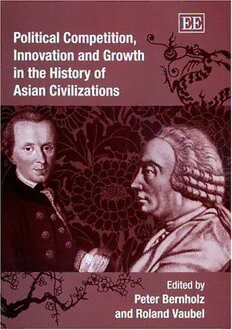
Political Competition, Innovation And Growth In The History Of Asian Civilizations PDF
239 Pages·2004·1.695 MB·English
Most books are stored in the elastic cloud where traffic is expensive. For this reason, we have a limit on daily download.
Preview Political Competition, Innovation And Growth In The History Of Asian Civilizations
Description:
Do political decentralization and inter state competition favor innovation and growth? There has long been a lively debate surrounding this question, going back to David Hume and Immanuel Kant. This book is a new attempt to test its veracity. The existing literature tends to assume that the beneficial effects of inter state competition have been confined to European history. By contrast, China, India and the Islamic Middle East are regarded as inherently imperial and overcentralized. However, these civilizations have not always been unified politically. In their history, there have been long spells of decentralized rule or inter state competition. The same is true for Japan. If the Hume-Kant hypothesis is correct, it should also apply to those periods. This volume analyzes the qualitative and quantitative evidence. The authors comprise eminent historians, sociologists, economists and socio-psychologists and the resulting book is a truly interdisciplinary enterprise. Addressing a wide readership, this book will hold strong appeal for scholars and researchers of general, Asian and economic history, political economy, political science and sociology.
See more
The list of books you might like
Most books are stored in the elastic cloud where traffic is expensive. For this reason, we have a limit on daily download.
